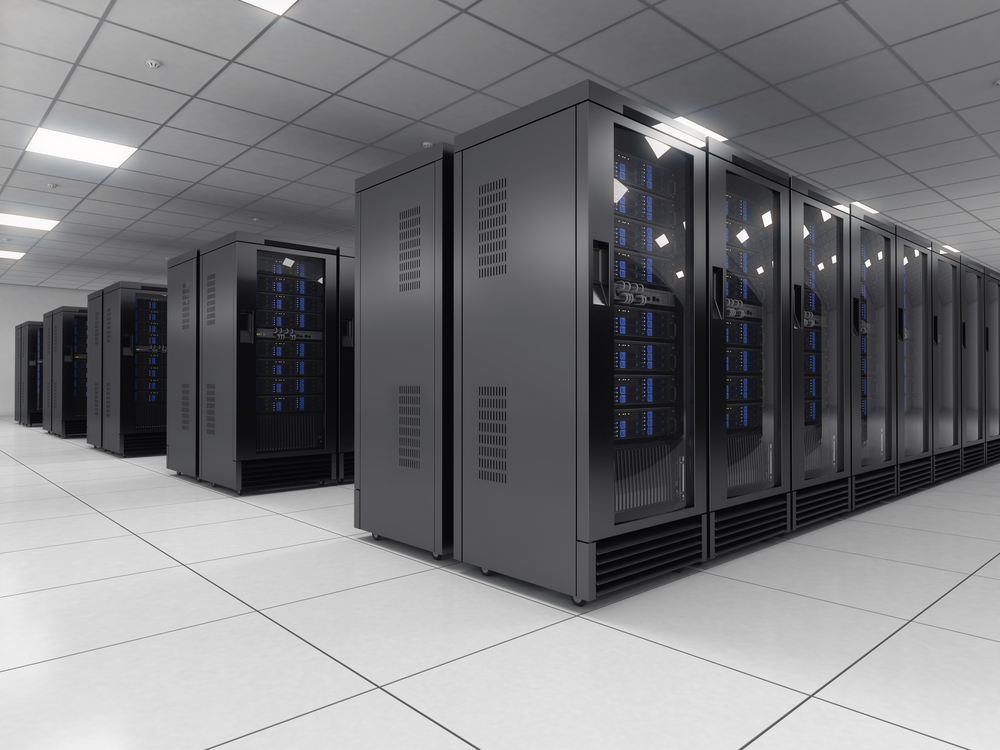What is a data center? In the age of digital revolution, data centers have evolved and surfaced as pivotal structures, playing an indispensable role in the business environment. The escalating demand for data handling, storage, and dissemination has spurred the evolution of data centers, making them intricate and multi-dimensional entities. Data centers are designed to handle large amounts of data, and their importance has grown with the rise of big data and cloud computing.
This article dives into the multi-dimensional nature of modern data centers, their importance in business operations, particularly for Small Businesses, and the core components like servers and network infrastructure in a data center that underpin their functionality.
A futuristic perspective is adopted, to foster a critical understanding of potential developments and challenges in this rapidly evolving field.
This comprehensive exploration of data centers, with a focus on servers and network infrastructure, will provide enriching insights for those seeking a deeper understanding of this fundamental aspect of contemporary digital ecosystems.
Key Takeaways
- Data centers are critical infrastructures, providing cost-effective and efficient data storage and compute solutions. They serve as the backbone for business applications and workloads, ensuring the seamless flow of digital services and fulfilling regulatory compliance obligations.
- Data centers are vital for business operations, ensuring the seamless flow of digital services and fulfilling regulatory compliance obligations.
- The core components of a data center include servers, storage systems, network infrastructure, and security devices, which continue to evolve in the digital age.
- Data centers house power subsystems, cooling systems, and backup generators, offering reliable IT support and allowing businesses to focus on their core operations.
What is a Cloud Data Center? Defining the Modern Data Center
A modern cloud data center is characterized by its ability to seamlessly integrate and communicate across multiple sites, leveraging the power of virtual networks and multicloud environments to provide cost-effective, efficient, and scalable data storage and processing solutions. This is made possible by the servers that form the backbone of the data center, which are designed to support business applications and handle various workloads.
This transformation in data center design, driven by advancements in server technology and network infrastructure, represents a radical shift from traditional, physical infrastructure, embracing a future where data exists and interacts across various locations.
This futuristic perspective highlights the critical role of modern data center infrastructure, particularly the servers and network systems, in fostering inclusivity, enabling even small businesses to thrive in a competitive landscape.
By adopting this approach, enterprises secure their future place and cultivate a sense of belonging among stakeholders who appreciate the resilience, flexibility, and cost efficiency offered by multicloud environments. This approach also allows for data center transformation, enabling businesses to adapt to changing technological landscapes.
Why are Servers in a Data Center Important to Business?

Why are Servers in a Data Center Important to Business?
Business operations, particularly those involving digital transactions and services, highly depend on reliable and secure infrastructures, including network systems, for storing and managing crucial information.
In this context, data centers are not merely storage facilities but vital enablers for business applications. They provide a robust environment for safeguarding critical applications and data, ensuring the seamless flow of digital services integral to business operations.
The importance of data centers is not confined to operational efficiency alone. By adhering to stringent security protocols, they aid businesses in fulfilling regulatory compliance obligations while enhancing the trust quotient among stakeholders.
In an increasingly digital future, data centers will become the heart of businesses, playing a pivotal role in shaping their resilience, agility, and competitive edge.
Core Components of a Data Center: Focusing on Servers in a Data Center
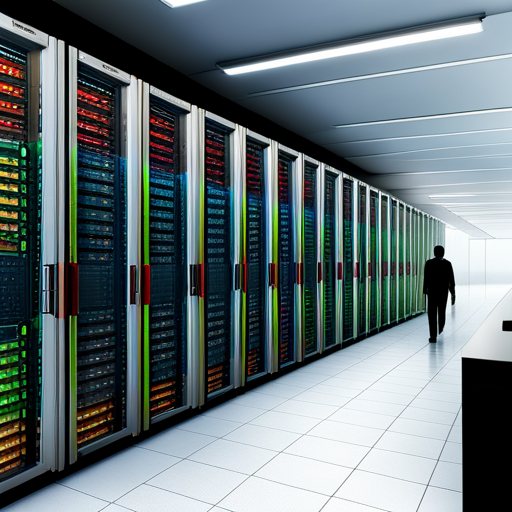
Several key components of a data center are integral to the functioning of digital infrastructure. These components, namely servers, storage systems, network infrastructure, and security devices, play distinct yet interconnected roles in ensuring seamless operation, robust security, and constant availability. Data center servers, the brains of the operation, process and store information, serving as the backbone of an interconnected, data-driven world.
What is data center operation like? Data center servers, the brains of the operation, process and store information, serving as the backbone of an interconnected, data-driven world.” These servers in a data center are essential for businesses like those owned by Small Business Sam, ensuring smooth operations and data accessibility.
On the other hand, storage systems serve as the memory of the data center. They interconnect with the servers in a data center, providing the necessary space to store and access data efficiently.
Network infrastructure operates as the nervous system of the data center. It enables the seamless flow of data between servers in a data center, storage systems, and other devices, ensuring connectivity and communication. This network infrastructure is crucial for cloud service provision and plays a significant role in hybrid cloud environments.
Security devices are crucial components that act as a shield, safeguarding the valuable data center equipment from internal and external threats. They provide data center security, protecting against unauthorized access, data breaches, and other security risks, ensuring that the data center is a fortress for Small Business Sam’s valuable data.
As we navigate the digital age, these components, especially servers in a data center, continue to evolve, adapt, and innovate. They offer technological solutions and provide a sense of security and reliability in a connected world.
How Do Data Centers Operate?
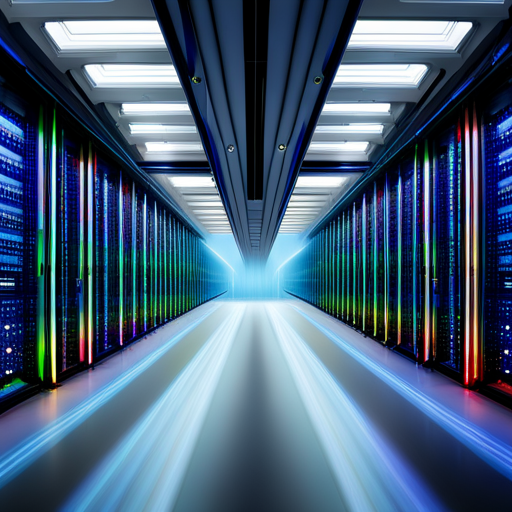
Maintaining optimal performance and security in the digital infrastructure, especially in a data center, necessitates a complex orchestration of processes. This includes the deployment of network security appliances and application delivery assurance mechanisms, ensuring that servers in a data center operate smoothly and securely. These measures are pivotal in the operation of data centers as they safeguard data integrity and bolster application performance, ensuring service reliability.
The precise architecture of data center facilities, including the arrangement of servers in a data center, is designed to shield critical business data from cyber threats. This includes implementing robust physical security measures and employing advanced cybersecurity technologies. These measures work together to create a secure environment where data is protected from unauthorized access and potential breaches.
In addition to security, proactive management of data center infrastructure, particularly the servers in a data center, plays a crucial role in ensuring smooth operations. Regular monitoring and maintenance activities are conducted to optimize resource use and prevent potential IT issues, providing peace of mind for Small Businesses. By identifying and resolving problems before they escalate, downtime is minimized, and the data center’s overall performance is optimized.
For businesses that aim to thrive in an interconnected digital world, the operational nuances of data centers offer the reassurance of data accessibility and security. Data centers are indispensable in contemporary business operations by providing a reliable and secure environment for storing, processing, and accessing critical data.
What is in a Data Center Facility?
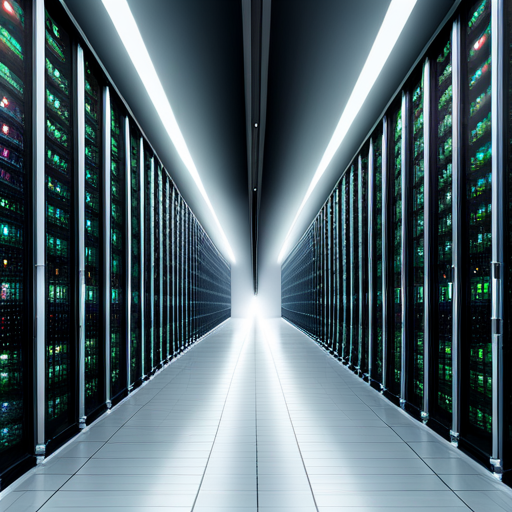
A comprehensive understanding of the infrastructure housed within these digital hubs is crucial, as it underscores the robust and complex systems supporting the continuous, safe and efficient operation of these facilities.
The data center is a physical embodiment of intricate technology, embodying core components of a data storage and management system. Power subsystems, UPS, cooling systems, fire suppression units, backup generators, and external network connections are vital elements that constitute what is in a data center facility.
These components ensure operational continuity and provide a safety net against potential threats, guaranteeing uninterrupted access to data.
By creating an environment of belonging, these facilities assure businesses of reliable, always-on IT support, freeing them to concentrate solely on their core operations. This is particularly beneficial for enterprise data centers that need to ensure constant availability and performance.
Standards for Data Center Infrastructure
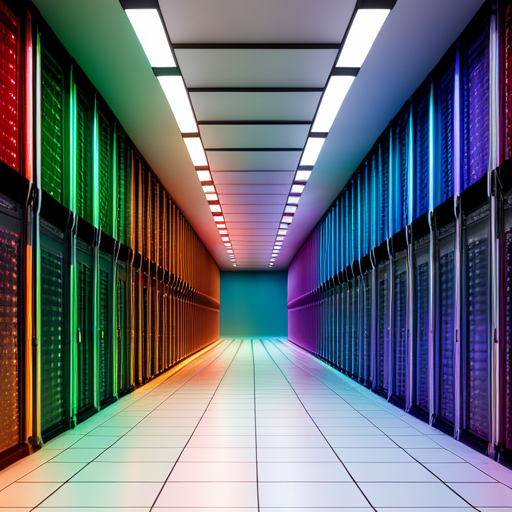
Establishing rigorous standards for the infrastructure of digital storage facilities is essential to ensure their reliable and efficient operation. The ANSI/TIA-942 standard for data center infrastructure is an exemplary guide in this regard, covering architectural, electrical, mechanical, and telecommunication aspects.
This infrastructure standard for data centers categorizes them into four tiers, each with ascending levels of redundancy and reliability. The tier system, ranging from the basic Tier 1 to the highly complex Tier 4, provides a remarkable framework for assessing the quality and reliability of a data center infrastructure.
This classification not only fosters awareness but also cultivates a sense of belonging among stakeholders, by offering a clear understanding of the service level they can expect from a data center.
Securing Your Servers in a Data Center: The Next Steps
Understanding what is a data center and its integral components, particularly the servers in a data center, is crucial for businesses like yours, Small Business Sam. As we navigate the digital age, these components continue to evolve, offering technological solutions that provide a sense of security and reliability in a connected world.
However, managing a data center and ensuring its smooth operation can be a complex task. This is where we, at ZZ Servers, come into play. Our team of experts can help you navigate the intricacies of data center management, from ensuring the seamless operation of servers to implementing robust security measures.
At ZZ Servers, we understand that your focus should be on your core business operations. That’s why we offer comprehensive Managed IT Services, taking care of your IT infrastructure so you can concentrate on what you do best. Our services include proactive monitoring and maintenance of your data center infrastructure, ensuring optimal performance and minimizing downtime.
Moreover, we understand the importance of data security. Our team is committed to safeguarding your valuable data from potential threats, implementing advanced cybersecurity technologies to protect your data center from unauthorized access and potential breaches.
So, why wait? Contact us today to learn more about how ZZ Servers can assist you with your data center needs. Let us help you thrive in an interconnected digital world, providing you with the peace of mind that your data is secure and accessible, and your IT infrastructure is in capable hands.
